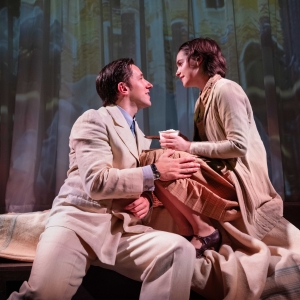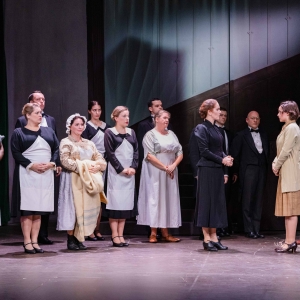Rebecca - 2023 West End History , Info & More
Charing Cross Theatre
The Arches Villiers Street London
‘Rebecca’, by Michael Kunze and Sylvester Levay, two of the most successful German-language musical theatre composers, had its world premiere at the VBW-theatre Raimund Theater in Vienna, Austria, in September 2006, where it went on to play to sold-out houses in three seasons, and where it is currently enjoying a successful revival.
Rebecca, with an orchestra of 18, will be directed by Alejandro Bonatto (director of the critically acclaimed production of Donizetti’s ‘Rita’ and the upcoming production of Francis Poulanc and Jean Cocteau’s ‘The Human Voice’ at Charing Cross Theatre later this month).
It has a new English translation by Christopher Hampton (two-time Tony Award winner Best Score & Best Book for ‘Sunset Boulevard’ and Oscar winner for Best Adapted Screenplay ‘Dangerous Liaisons’ & ‘The Father’) and Michael Kunze.
Rebecca, with 22 original songs, is a gripping thriller full of intrigue and surprises that sticks closely to the original novel. Wealthy Maxim De Winter brings his naïve new wife home to his Cornish estate, Manderley, where the manipulative housekeeper, Mrs. Danvers, resents the new wife’s intrusion. She persuades her that she is an unworthy replacement for the first Mrs. De Winter, the glamorous and mysterious Rebecca, who perished in a drowning accident, with tragic results...
The world-famous novel was also turned into a celebrated Alfred Hitchcock film in 1940, starring Laurence Olivier, Joan Fontaine, Judith Anderson, George Sanders and Gladys Cooper. It was nominated for 11 Oscars, winning two awards; Best Picture and Best Cinematography.
FEATURED REVIEWS FOR Rebecca
Rebecca at Charing Cross Theatre | Review
4 / 10
There are some very earnest attempts to maximise dramatic effect in this melodrama, which has very lush orchestrations – the production has already made headlines for having an eighteen-strong orchestra in a venue that seats a maximum of 265 – but an almost absurdly clunky set. The slotting together of set pieces and pulling apart of others could be audibly heard behind curtains that had been drawn across the stage during supposedly more private scenes. The stage-wide fixed staircase, regularly used throughout, wouldn’t look out of place at the Theatre Royal Drury Lane (capacity: 2,196), and the costumes are all suitably from the interwar period.
Rebecca musical has its UK premiere – review
4 / 10
Ultimately, not every story lends itself to the musical treatment, and with its low level menace and murky remembrances and recriminations, Rebecca might work better as a modern opera, something along the lines of Britten’s The Turn of the Screw. As a tuner stuffed with big belting numbers, it’s too sincere to be high camp (although the final image of Lane’s Danvers, her immaculate coiffure all let loose, processing up an apparently burning staircase for one last time, comes pretty close), and too schlocky to take seriously. This show has a passionate worldwide fan base which will probably grow even further here, but once was more than enough for me.
Rebecca FREQUENTLY ASKED QUESTIONS
Rebecca History
Other Productions of Rebecca
| 2023 | West End |
West End |
Videos




